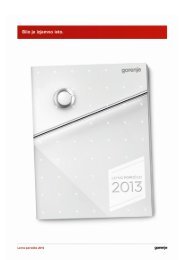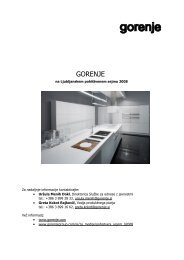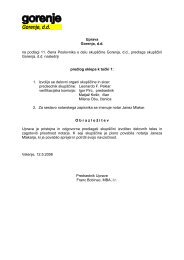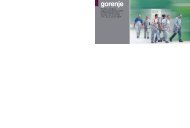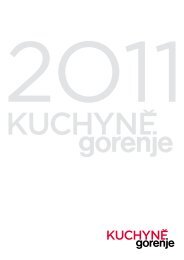ANNUAL REPORT 2008 - Gorenje Group
ANNUAL REPORT 2008 - Gorenje Group
ANNUAL REPORT 2008 - Gorenje Group
You also want an ePaper? Increase the reach of your titles
YUMPU automatically turns print PDFs into web optimized ePapers that Google loves.
60<br />
<strong>2008</strong><br />
3.10.2 FINANCIAL RISK MANAGEMENT<br />
Financial risk control has pursued the internal financial policies including the starting points for<br />
efficient and systematic management of financial risks.<br />
The exposure and measures for hedging against them have been taken; it has been judged on the<br />
basis of effects on cash flows. Suitable hedging activities have been carried out in scope of ordinary<br />
activities in the operating, investing and financial areas.<br />
FINANCIAL RISKS: credit risks; currency risks; interest rate risks; liquidity risks.<br />
Due to the increasingly difficult macro-economic situation the attention paid to credit risks has<br />
been concentrated and includes all risks reducing the economic benefits of the company due to<br />
unsettlement of contractual obligations of business partners (customers). The control of exposure<br />
by the sets of measures:<br />
• security of the major part of operating receivables against credit risks with the<br />
Slovene Export Company (Slovenska izvozna družba – Prva kreditna zavarovalnica,<br />
d.d., and other insurance companies.<br />
• Additional security of more risky receivables due from customers by mortgages,<br />
bank guarantees, and other security instruments.<br />
• Regular control of operation and financial position of all new and existing business<br />
partners and limiting of exposure to individual business partners.<br />
• Joint and chain offset with customers.<br />
• Systematic and active control processes of credit overdrafts and collection of<br />
receivables.<br />
The management board of the <strong>Gorenje</strong> <strong>Group</strong> has assessed that the exposure to credit risks is<br />
moderate due to the measures mentioned.<br />
The <strong>Group</strong> is greatly exposed to currency risks due to the geographic diversification of operation,<br />
where the economic benefits of the company may decrease due to changes in the exchange rate<br />
of an individual currency. The exposure of cash flows and balance sheet has been considered in the<br />
valuation of risks. These risks are high in the markets of Serbia, Great Britain, Czech Republic, Slovakia,<br />
Poland, Hungary, Croatia and in all US $ markets. Regardless of the measures taken the management<br />
board of the <strong>Gorenje</strong> <strong>Group</strong> has assessed that the exposure to currency risks is high<br />
due to relevant macro-economic changes and fluctuations of mostly East- European currencies.<br />
Great attention has been devoted to interest rate risks reducing the economic benefits of the company<br />
due to a change in total interest rates in the market. The hedging scope has reduced and the<br />
share of fixed interest rates and derived financial instruments accounts for 37.6 % of credit portfolio<br />
of the <strong>Group</strong> at the end of the financial year <strong>2008</strong>. The management board of the <strong>Gorenje</strong> <strong>Group</strong><br />
has assessed that the exposure to interest rate risk is high.<br />
Liquidity risk includes risks associated with the lack of financial resources available and consequently<br />
the inability of the company to settle its liabilities in the term-limits agreed. The financial liabilities of<br />
the <strong>Gorenje</strong> <strong>Group</strong> amounting to EUR 278 million mature in the year 2009 and therefore discussions<br />
with banks relating to the re-financing of the existing financial liabilities started in the last quarter of<br />
the year <strong>2008</strong>. Thus the refinancing risks reduced. A liquidity reserve amounting to EUR 76.6 million<br />
including unused revolving lines and cash of the <strong>Group</strong> in banks provides short-term regulation of<br />
cash flows and reduces short-term liquidity risks. The risk of short-term liquidity of the <strong>Group</strong> has<br />
been assessed as increased due to efficient cash management, appropriate credit lines available<br />
for short-term cash flow regulation, high financial flexibility and good access to financial markets<br />
and resources. The reason for the increased risk is the reduction in financial resources available<br />
from business partners (customers and suppliers). A long-term liquidity risk as a consequence of<br />
successful operation, efficient asset management, sustained ability of generating cash flows from<br />
operating activities and suitable equity structure has been assessed as moderate. The management<br />
board of the <strong>Gorenje</strong> <strong>Group</strong> has assessed that the exposure to the liquidity risk is moderate.



